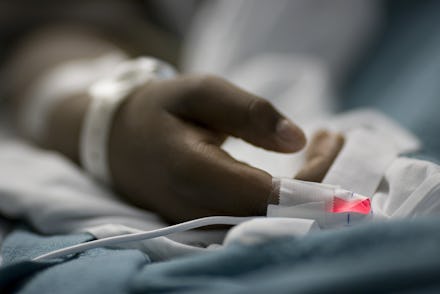Why Black Americans are dying from coronavirus at staggering rates

Recent data reveal a troubling trend in which demographics COVID-19 has hit the hardest. Black residents comprise only a third of the population in Louisiana, yet around 70% of patients who’ve died are Black, the New York Times reports. And despite accounting for less than a third of the population in Chicago, more than half of those who’ve tested positive for the disease are Black. More concerning still, Black Chicagoans make up a staggering 72% of those who’ve died. Similar patterns have emerged in Milwaukee, Connecticut, North Carolina, South Carolina, and the Las Vegas area. Across the board, Black Americans are getting sick, and dying from, coronavirus at disproportionate rates.
These inequalities are only the latest in a legacy of this country’s rampant, centuries-long racism against Black Americans. Slavery was justified by the very belief that Black people are less than human, which pervaded all facets of society, including healthcare, according to the American Journal of Public Health.
From J. Marion Sims’s surgical procedures on enslaved women, without anesthesia, to the Tuskegee syphilis study, the medical establishment has a track record of violence against and exploitation of Black Americans. This dehumanization persists in healthcare even today, from the underdiagnosis of disease in Black patients to the higher maternal mortality rate among Black women compared to white women in the US, and can include even affluent Black Americans, Johnson explains in his feature in VICE about how race anchors health for Black Americans.
From J. Marion Sims’s surgical procedures on enslaved women, without anesthesia, to the Tuskegee syphilis study, the medical establishment has a track record of violence against and exploitation of Black Americans.
Redlining, which systematically shut Black Americans out of the opportunity to accumulate wealth, also undergirds modern-day disparities, Jason Purnell, a professor of public health at Washington University in St. Louis, told VICE. Sharrelle Barber, an assistant research professor of epidemiology and biostatistics at Drexel University, explained to the Times that as a result of redlining, many Black Americans don’t have access to stable housing, healthy food, employment opportunities, or other basic necessities, meaning disproportionate rates of diabetes and asthma.
These disparities render Black Americans especially susceptible to outbreaks, the Times reports. Besides being more likely to have asthma and other underlying health problems, they’re less likely to have insurance, and racial bias makes medical professionals less likely to test and treat them. They also disproportionately work in professions that prevent them staying home.
The data demonstrating COVID-19’s disproportionate impact on Black Americans carries a major caveat, though: its incompleteness, which makes it hard to generalize state and local trends to the country as a whole, the Times reports. Information on patients’ race isn’t available for much of the total cases in many of the locations examined, and officials in many states, including beleaguered New York and New Jersey, haven’t made statewide racial and ethnic data available.
But the lack of this data is yet another form of inequality, considering the “clear vulnerability of people of color in this public health emergency,” Senators Kamala Harris of California, Cory Booker of New Jersey, and Elizabeth Warren of Massachusetts wrote in a letter to the Trump administration demanding it gather such data from those tested or treated for COVID-19, per the Times.
Some places are already poised to utilize racial and ethnic data on coronavirus to narrow health disparities. The Times reports that in Chicago, officials announced plans to order health providers to make demographic information on all COVID-19 patients available so Chicago could dispatch “racial inequity rapid response teams,” as the mayor refers to them, to offer support such as enforcing social distancing and monitoring symptoms.
“These communities, structurally, they’re breeding grounds for the transmission of the disease,” Barber told the Times. “It’s not biological.” Humans systematically created the inequalities laid bare by the recent racial breakdowns of coronavirus cases and deaths; here’s to hoping that those in power use the new data toward systematically undoing them, too.